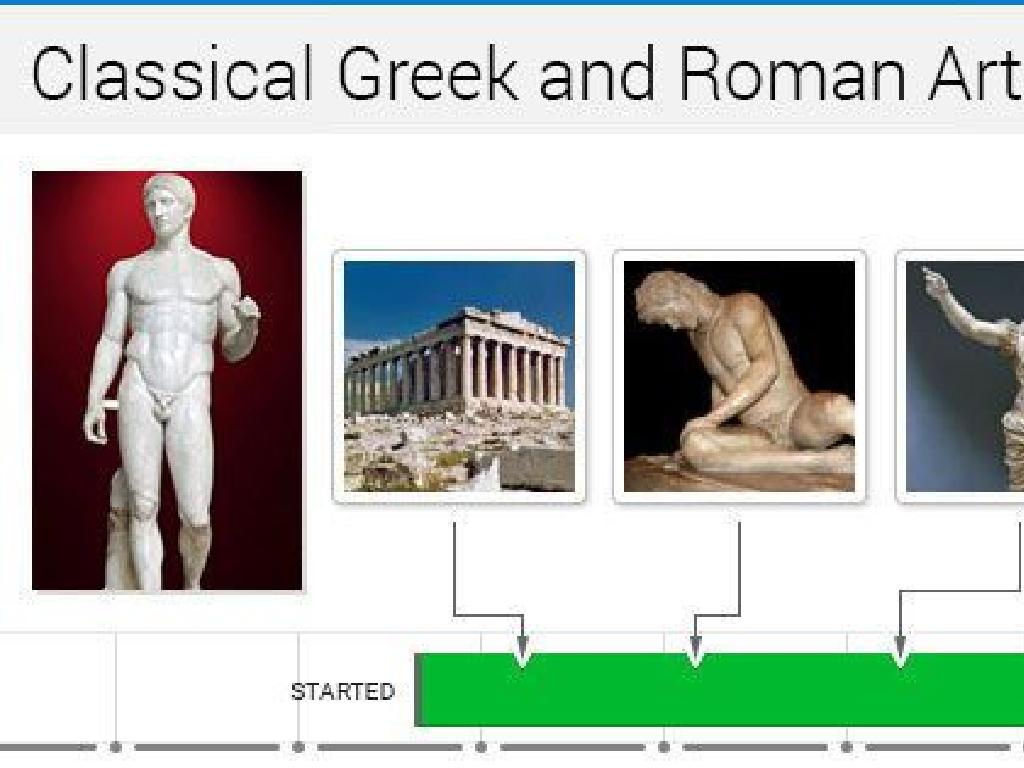Determine The Meanings Of Greek And Latin Roots
Subject: Language arts
Grade: Eighth grade
Topic: Greek And Latin Roots
Please LOG IN to download the presentation. Access is available to registered users only.
View More Content
Introduction to Greek and Latin Roots
– Explore English building blocks
– Define Greek and Latin roots
– Roots are word parts that carry meaning, originating from Greek or Latin
– Understand roots importance
– They form a large portion of English words, aiding in deciphering unfamiliar vocabulary
– Roots impact on vocabulary
– Knowing roots helps in understanding complex words and expanding one’s own lexicon
|
This slide introduces the concept of Greek and Latin roots, which are the foundational elements of many English words. Emphasize that a root is the basic part of a word that carries its core meaning, and these roots often originate from Greek and Latin languages. Understanding these roots is crucial for students as it helps them to decode meanings of new words and enriches their vocabulary. This knowledge is particularly beneficial for understanding academic and domain-specific language. Encourage students to become word detectives, looking for familiar roots in new vocabulary they encounter across subjects.
The Power of Roots in Language
– Roots: word building blocks
– Combining roots with affixes
– Prefixes/suffixes modify root meanings
– Common roots and meanings
– ‘bio’ means life, ‘geo’ means earth
– Deciphering words using roots
– Use roots to understand unfamiliar words
|
This slide introduces students to the concept of roots, which are the fundamental parts of words, particularly in the English language, which borrows heavily from Greek and Latin. Understanding roots can help students decipher the meaning of new vocabulary. For example, ‘biology’ (the study of life) combines the root ‘bio’ (life) with the suffix ‘-logy’ (study of). Similarly, ‘geography’ (study of earth’s surface) combines ‘geo’ (earth) with ‘-graphy’ (writing or study). Encourage students to think of words as puzzles and roots as pieces that, when combined with prefixes and suffixes, create a clear picture of the word’s meaning. This understanding can greatly enhance vocabulary and comprehension skills.
Exploring Greek Roots in English
– ‘bio’ signifies life
– e.g., ‘biology’ (study of life)
– ‘geo’ relates to earth
– e.g., ‘geography’ (study of earth’s surface)
– ‘phon’ denotes sound
– e.g., ‘symphony’ (harmony of sounds)
|
This slide introduces students to the concept of Greek roots in English vocabulary, which helps in understanding the meaning of new words. ‘Bio’ is a common root that students will recognize in various science terms, indicating life or living organisms. ‘Geo’ is another root frequently encountered in subjects like geography, geology, and geometry, all relating to earth in some way. ‘Phon’ is found in words related to sound, such as ‘symphony,’ a term they might be familiar with from music. Encourage students to think of other words that use these roots. This understanding can help them deduce the meanings of unfamiliar words they encounter in their reading.
Exploring Latin Roots
– ‘aqua’ means water
– Example: ‘aquarium’ – a water container for fish
– ‘vid’ means see
– Example: ‘video’ – a medium to see recorded content
– ‘port’ means carry
– Example: ‘transport’ – to carry goods or people from one place to another
|
This slide introduces students to the concept of Latin roots, which are the building blocks of many words in the English language. Understanding these roots can help students decipher the meaning of unfamiliar words. ‘Aqua’ is a common root that appears in words related to water, ‘vid’ is found in words related to seeing or visual aspects, and ‘port’ is used in words that involve carrying or moving. Encourage students to think of other words that contain these roots. This understanding will enhance their vocabulary and reading comprehension skills.
Decoding Words with Greek and Latin Roots
– Strategies for new word meanings
– Break down words into roots and affixes
– Use roots to understand words
– Roots give clues to a word’s definition
– Practice with example words
– ‘spect’ means look: inspect, spectator, perspective
|
This slide aims to equip students with strategies to decode unfamiliar words by understanding Greek and Latin roots. Emphasize the importance of breaking down complex words into their basic elements roots, prefixes, and suffixes to uncover meaning. Provide examples of common roots and their meanings, and show how they form different words. Encourage students to practice with example words, analyzing how their roots contribute to their definitions. This foundational skill will enhance vocabulary and reading comprehension. In the next class, students can apply these strategies to new words and share their findings.
Class Activity: Crafting Your Root Word Tree
– Create a Root Word Tree diagram
– Select a Greek or Latin root
– Pick a root like ‘bio’ (life) or ‘aqua’ (water)
– Branch out with derived words
– Add words like ‘biology’, ‘biography’, ‘aquarium’, ‘aquatic’
– Present your tree to the class
|
This activity is designed to help students visually understand the relationship between root words and their derivatives. Students will choose a Greek or Latin root and create a tree diagram where the root word is the base of the tree, and each branch represents a word derived from that root. Encourage creativity in the design of their trees. Provide examples of roots and derived words to guide them. Possible activities: one student can choose ‘bio’ and create branches for ‘biology’, ‘biodegradable’, etc., while another chooses ‘aqua’ for ‘aquatic’, ‘aquarium’. This will help them see how many English words are connected to ancient languages and enhance their vocabulary skills.
Wrapping Up: Greek and Latin Roots
– Recap: Why roots matter
– Homework: Discover 5 words
– Find words with Greek or Latin origins
– Decode words with roots
– Analyze the roots for meaning
– Upcoming quiz preparation
– Review roots for quiz readiness
|
As we conclude today’s lesson, remind students of the significance of understanding Greek and Latin roots in enhancing their vocabulary and comprehension skills. For homework, students should find five new words that contain Greek or Latin roots and research their meanings. Encourage them to look beyond the surface and really delve into how the root contributes to the word’s definition. This exercise will not only prepare them for the upcoming quiz but also reinforce their ability to decode unfamiliar words in the future. Provide some strategies for studying and offer to help if anyone is struggling with the concept.






